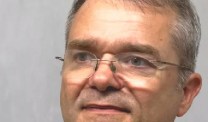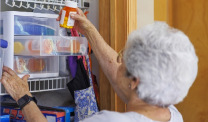Webinar Recap: How Mesothelioma Patient Advocates Help
Cancer & CaregivingWritten by Travis Rodgers | Edited by Amy Edel

Our latest exclusive webinar, Navigating Mesothelioma: How Patient Advocates Help, gave survivors and their loved ones a chance to hear directly from our team what it’s like to work with them and to feel their support. They emphasized their shared goal is simple: no person facing mesothelioma should ever feel alone.
Webinar moderator Amy Pelegrin, director of Hospice Care here at The Mesothelioma Center, kicked off the virtual event addressing the challenges patients and their families face after a mesothelioma diagnosis. She noted, “Mesothelioma care involves so much more than just treatment, from finding the right doctor to managing costs, understanding what resources are available to you and getting emotional support.”
Board-certified Patient Advocate Karen Selby, RN, discussed the key difference between broad patient advocacy and working with a Patient Advocate with mesothelioma-specific experience and focus. She noted, “accredited cancer centers recognize how challenging a new diagnosis can be, and offer a patient advocate on their staff,” but it’s often not advocacy and expertise “at the mesothelioma level.”
Karen added, “That’s why we feel it’s very important that our center specializes in mesothelioma. And we have board certified advocates and specialists on staff here that can help you navigate with that specific skill set, for the needs of a mesothelioma patient.”
It’s very important to get connected with someone that can actually walk with you through that journey.
What Is Doctor Match for Mesothelioma Patients?
Missy Miller, director of our Medical Outreach program, addressed questions about how we help people find a mesothelioma doctor. Doctor Match connects people to specialists who can treat their specific mesothelioma type. Not every oncologist treats mesothelioma, and not every mesothelioma expert focuses on every subtype. Our Patient Advocates review the details of your diagnosis, location and insurance, and take your preferences and personal goals into account, to match you with the doctor best suited to your care.
Our Medical Outreach team travels nationwide, meeting top specialists in person at treatment centers, conferences and research hubs. These connections build trusted relationships and expand the options available to survivors. Our Patient Advocates use these relationships to connect people with the doctors most appropriate for their needs.
“We handle all scheduling and follow-up care so patients and families don’t have to,” Missy explained. “We offer ongoing support throughout the treatment journey. Our support doesn’t end after we schedule the appointment.” She added, they also explain treatment options to help patients “make informed decisions about their care.”
For people interested in new mesothelioma treatments, Missy described how our Patient Advocate team identifies mesothelioma clinical trials near the patient, reviews criteria and coordinates appointments. This level of support helps survivors access make promising care options.
We help provide quicker, more streamlined access to specialized care.
Financial Assistance for People With Mesothelioma
Financial advocate Danielle DiPietro outlined how Patient Advocates help people with mesothelioma and their families access financial assistance. They help you tap into programs that provide support for treatment costs and day-to-day living expenses. Danielle explained how our Patient Advocates connect you to resources tailored to your personal situation.
Types of Financial Assistance
- Caregiver leave: Certain states provide income and job protection while caring for a parent, spouse or loved one.
- Co-payment assistance: Some pharmaceutical companies offer programs to help with the out-of-pocket costs of mesothelioma medications.
- Grants for medical expenses: Funds to help with treatment-related costs.
- Legal assistance: Options to pursue compensation for asbestos exposure.
- Local resources: Community programs that help with day-to-day living expenses.
- Social Security Disability: Programs such as Compassionate Allowance for patients not receiving Social Security retirement benefits.
- Travel grants: Financial support for care-related travel.
Patient Advocates support patients and families throughout the financial assistance process. They review each person’s situation, gather key information, and work directly with patients to complete applications and access resources. When needed, Advocates coordinate directly with organizations or government offices to make sure patients get the help available to them.
There are times where the Patient Advocate will get on a conference call. We can do a three-way call with the organization or with the Social Security office and the patient to make sure the process is smooth and they get the help that’s available to them.
Legal Avenues for Mesothelioma Compensation
Danielle shared that patients often find the legal process the most overwhelming aspect of financial assistance. Patient Advocates explain how this option for compensation works, gather details about your work history and asbestos exposure and connect you with vetted law firms that have records of success handling mesothelioma claims like yours. They can guide you and your family so you can focus on your health while exploring legal options.
Step-by-Step Legal Process
- Gather your history: Your Patient Advocate will ask about jobs, work locations, family exposures, home renovations, auto repairs and use of talc products.
- Recommend law firm: They’ll suggest a mesothelioma law firm that best fits your goals and preferences, your exposure and the right jurisdiction for you to file in.
- Schedule initial call: Set up the first phone or virtual meeting between you and a mesothelioma lawyer.
- Coordinate meetings: Support in-person, video or phone meetings so the attorney or investigator can gather details to begin to propose an approach for your case.
- Your decision: Ensure you and your family have what you need to make a decision about seeking compensation.
Patient Advocates maintain contact throughout the process. They answer questions, check on the patient’s comfort with the legal team, and coordinate next steps as needed. Danielle said, “When we speak with patients and their families, our goal is to recommend a firm that is best suited for this specific case. We understand what criteria law firms should meet to successfully assist with filing these unique claims.”
We understand you have a lot going on medically and emotionally during this journey. We’ve done this research for you. We want to remove that stress for you.
How Patient Advocates Guide Veterans With Mesothelioma Through VA Benefits
Former U.S. Army Capt. Aaron Munz, director of the Veterans Program at The Mesothelioma Center, highlighted the unique challenges veterans face when applying for VA benefits. Mesothelioma often develops decades after military service, making it difficult to link a current diagnosis to past asbestos exposure. Patient Advocates guide veterans with mesothelioma and their families through the process, helping them gather documentation, understand requirements and access the resources available.
How We Help Navigate VA Benefits
- Confirm eligibility: Review military service, discharge status and mesothelioma diagnosis to ensure veterans qualify for VA benefits.
- Document exposure: Help veterans detail where, when and how exposure to asbestos occurred in both military and civilian work.
- Coordinate medical evidence: Connect veterans with doctors to obtain nexus statements linking mesothelioma to asbestos exposure.
- Submit applications: Work with veterans and their doctors to obtain nexus statements, which link a mesothelioma diagnosis to asbestos exposure during military service. These statements are a key part of supporting VA benefits applications.
- Follow-Up and Support: Address denials, provide additional evidence and connect veterans with local resources or specialized law firms.
Aaron stressed that the process can be complex, but advocates help veterans navigate each step clearly and accurately. Most veterans he assists apply years after leaving service, and Patient Advocates ensure claims fully reflect their exposure history.
I’ve been through this system myself, so I know how challenging it can be. As both a veteran and a Patient Advocate, I help other veterans document their exposure, gather evidence, and navigate the VA process to make sure they get the benefits they deserve.
Emotional Support for Survivors and Caregivers
Karen shared, “We have an amazing set of resources. One in particular that I’m very passionate about, that Dana and I have been doing for many years now, is our online support group. We were online before online was it. So we’re really proud of that.”
Dana Nolan, a licensed mental health counselor with more than 25 years of experience helping mesothelioma and other cancer patients, co-hosts the support group with Karen. Together, they’ve created a welcoming space for the mesothelioma community.
“We leave it as an open platform for patients to just share their story, ask questions or answer questions that folks might ask,” Karen explained. The online support group meets the second Wednesday of every month at 8 PM Eastern Standard Time.
Karen also highlighted our private Facebook group. She noted, “We think that’s a very special group too, because it’s a private group and it’s specific and exclusive to mesothelioma patients and their caregivers. It’s an around the clock resource where you can ask questions, answer questions and get connected with patients and family members.”
We want it to be a safe community. We want everyone to feel comfortable to ask questions, answer questions or not say anything, just listen.
Educational Materials to Help You Make Empowered Decisions
Dr. Snehal Smart, a medical doctor and board-certified Patient Advocate at The Mesothelioma Center, highlighted our free educational resources. She noted, “Doctors often only have a few minutes to explain a diagnosis, treatment options and answer your questions. Your Patient Advocate is able to bridge that gap, providing literature, avoiding overwhelming medical terms and giving you information that you can revisit at your own pace.”
She said our customized packet of guides and checklists cover topics like nutrition and exercise, with comprehensive explanations, tips and even recipes. Guidance comes from renowned experts. For example, our exercise guide features recommendations from an oncology rehabilitation doctor tailored for mesothelioma patients.
Dr. Smart shared, “We regularly update our materials so they stay accurate and relevant. We also offer electronic copies, which makes it easier for families to share information with loved ones.”
Panini quote: “Personally, as a medical doctor, I believe these resources are especially valuable.”












